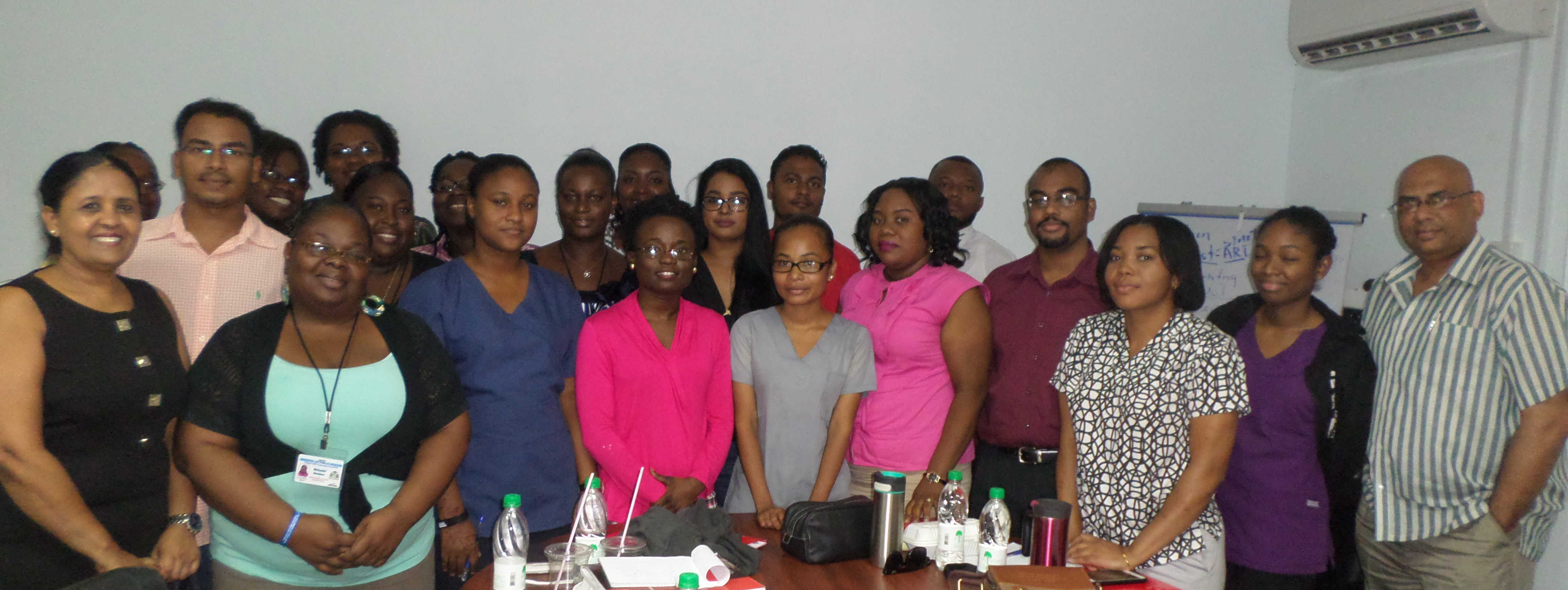
PANCAP Knowledge Coordinator conducts STI Management TrainingTraining focused on strategies for prevention and control of sexually transmitted infections
PANCAP Knowledge Coordinator, Dr Shanti Singh-Anthony, facilitated the Ministry of Public Health (Guyana)’s ‘STI Management’ training in July. Dr Singh-Anthony explained that the training was pivotal at a time when the landscape of STI infections is changing and doctors are required to significantly enhance their knowledge capacity regarding the treatment of STIs.
More than twenty (20) doctors from the Ministry of Health participated in a series of presentations and interactive group sessions facilitated by Dr Singh-Anthony held at the Georgetown Public Hospital (GPH).
The topics discussed included strategies for prevention and control of sexually transmitted infections. Participants were encouraged to utilize the 5Ps ( Partners, Practices, Prevention of Pregnancy, Protection from STIs and Past History of STIs) recommended by US Centers for Disease Control, in conducting a comprehensive risk assessment. Emphasis was placed on understanding prevention methods and the value of biomedical prevention such as HPV and Hepatitis B vaccinations. Expedited Partner Therapy (EPT) was prioritised as a critical intervention in the control of STIs. Diagnosis and management were presented using WHO recommended syndromic management approach and addressed genito-urinary discharge syndrome and genito-ulcer disease. These were presented as case studies.
Dr Singh-Anthony explained, ‘it is vital that doctors make use of the new research, literature and data available to consistently upgrade their knowledge of the new advances in the treatment of STIs. The science associated with the treatment of STIs is constantly changing and doctors must keep up with the advances in order to effectively treat patients and improve their health outcomes’.
WHAT IS PANCAP?
PANCAP is a Caribbean regional partnership of governments, regional civil society organisations, regional institutions and organisations, bilateral and multilateral agencies and contributing donor partners established on 14 February 2001. PANCAP provides a structured and unified approach to the Caribbean’s response to the HIV epidemic, and coordinates the response through the Caribbean Regional Strategic Framework on HIV and AIDS to maximise efficient use of resources and increase impact, mobilise resources and build the capacity of partners.
What are the Global AIDS Strategy 2021–2026 targets and commitments?
If targets and commitments in the strategy are achieved:
- The number of people who newly acquire HIV will decrease from 1.7 million in 2019 to less than 370 000 by 2025
- The number of people dying from AIDS-related illnesses will decrease from 690 000 in 2019 to less than 250 000 in 2025.
- The goal of eliminating new HIV infections among children will see the number of new HIV infections drop from 150,000 in 2019 to less than 22,000 in 2025.
What are the 95-95-95 Targets for ending AIDS?
- 95% of People Living with HIV know their HIV status;
- 95% of people who know their status on treatment; and
- 95% of people on treatment with suppressed viral loads.
HELPFUL LINKS:
Global AIDS Strategy 2021–2026, End Inequalities, End AIDS
https://pancap.org/pancap-documents/global-aids-strategy-2021-2026-end-inequalities-end-aids/
Caribbean Regional Strategic Framework on HIV and AIDS (CRSF) 2019-2025
https://pancap.org/pancap-documents/caribbean-regional-strategic-framework-2019-2025/
